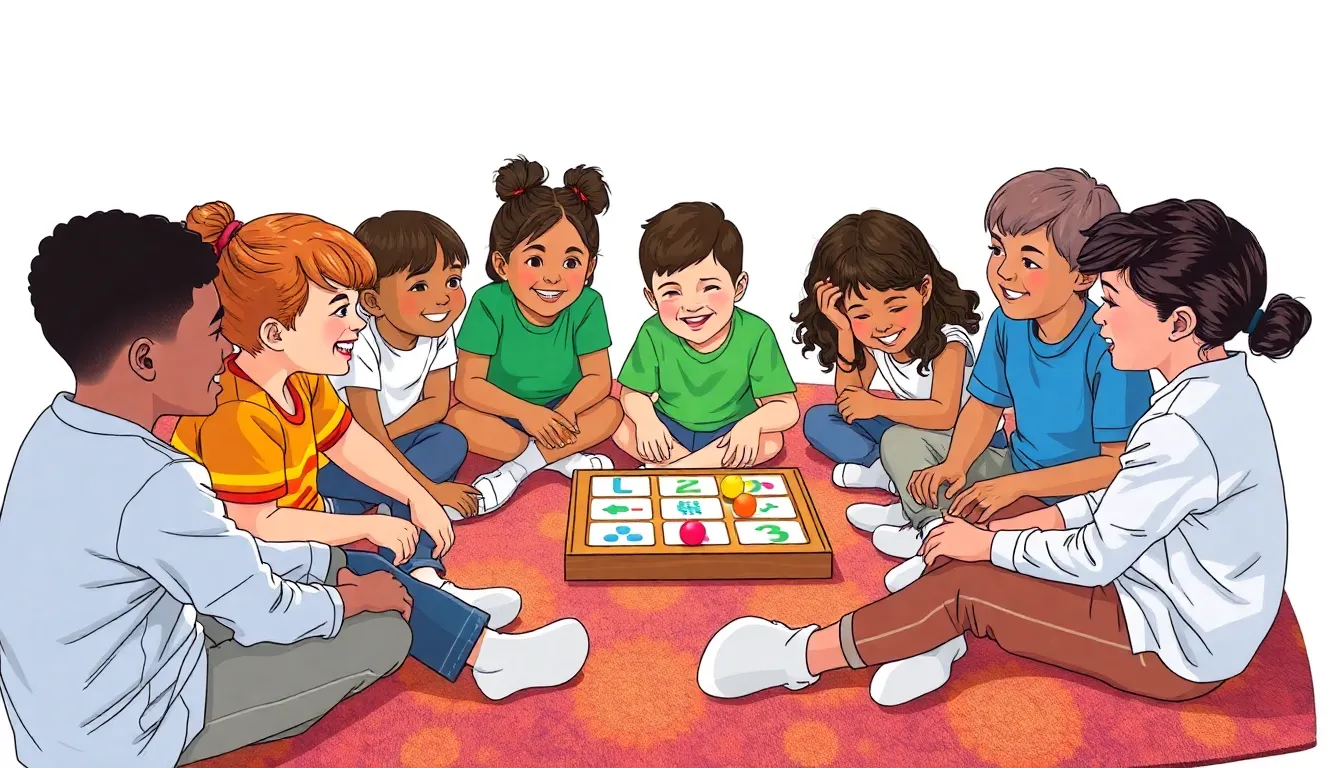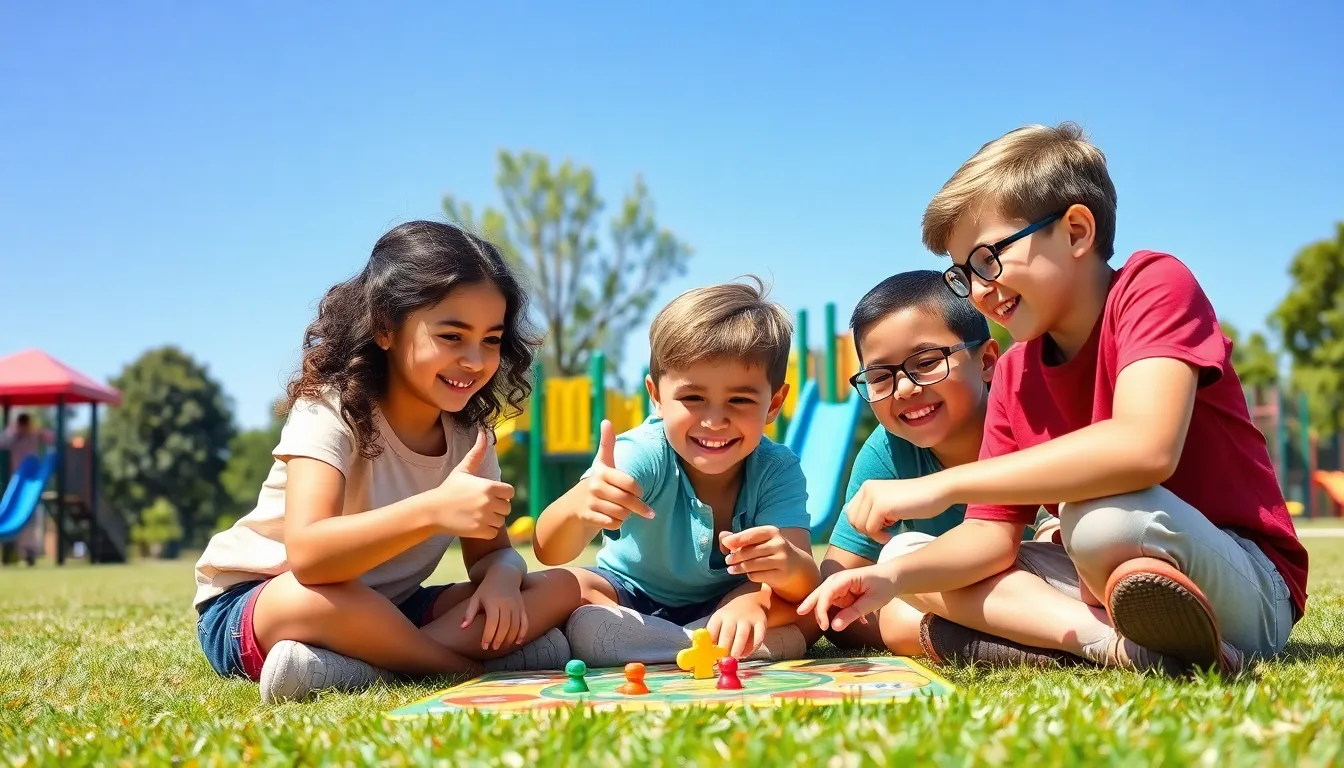In a world where kids juggle school, friends, and the occasional superhero fantasy, mental health often takes a back seat. But what if there was a way to boost their emotional well-being while having a blast? Enter mental health games for kids—where fun meets therapy in the most delightful way possible.
Table of Contents
ToggleUnderstanding Mental Health in Children
Mental health in children encompasses their emotional, psychological, and social well-being. This aspect affects how children think, feel, and behave. Recognizing signs of mental health issues in children is crucial. Symptoms may include changes in mood, behavior, or academic performance.
Anxiety disorders, depression, and attention-deficit/hyperactivity disorder (ADHD) represent common mental health conditions among children. Research indicates that approximately 1 in 6 children aged 2 to 8 years experience a mental health disorder. Early identification leads to effective interventions. Engaging in mental health games offers a novel approach to coping strategies.
Games designed for emotional learning enhance self-awareness among children. Skills like emotional regulation and problem-solving improve through play. Games reinforce positive social interactions, facilitating better relationships with peers. Games provide a safe space for expression, which is essential for emotional development.
Support from parents and caregivers remains vital. Open conversations about feelings encourage emotional intelligence in children. Educators can incorporate mental health games into curricula to promote classroom harmony. Community initiatives enhance overall well-being by offering resources and support networks.
Physical activity also ties into mental health. Exercise boosts mood and alleviates anxiety. Activities that integrate movement with playfulness create an enjoyable learning environment. Combining mental health education and physical engagement maximizes benefits for children.
Incorporating mental health awareness into daily routines fosters resilience. Familiarity with coping strategies equips children to handle challenges. Adopting a proactive approach toward mental health ensures children thrive emotionally, socially, and academically.
Benefits of Mental Health Games for Kids

Mental health games offer numerous benefits for children, playing a crucial role in their emotional and social development.
Enhancing Emotional Awareness
Mental health games help kids recognize and understand their emotions. By engaging with game scenarios, they identify feelings like happiness, sadness, or anger. Children build emotional vocabulary through these experiences, leading to better communication of their emotions. Games that encourage reflection on emotions foster self-awareness, enabling kids to acknowledge their feelings in real life. When children can identify emotions, they manage anxiety and develop resilience. Active participation in these games promotes emotional expression, creating a safe environment for discussing feelings. As a result, children are more equipped to navigate their emotional landscapes both now and in the future.
Improving Social Skills
Social interactions improve through mental health games, fostering teamwork and cooperation among players. Games that require collaboration teach valuable skills like negotiation and compromise. Such interactions help children develop empathy as they learn to appreciate others’ perspectives. As they engage with peers during gameplay, communication skills naturally enhance, providing opportunities to practice verbal and non-verbal cues. Collaborating in teams builds a sense of belonging, reducing feelings of isolation. When kids face challenges together, they strengthen friendships and build support networks. Overall, mental health games create dynamic settings for social learning, essential for emotional and social well-being.
Types of Mental Health Games
Various types of mental health games can enhance children’s emotional and social well-being. These games, ranging from board games to outdoor activities, foster valuable skills essential for coping with life’s challenges.
Board Games
Board games serve as interactive tools for developing emotional awareness. Games like “The Feelings Game” or “Emotions Bingo” encourage kids to identify and express their emotions in a fun way. They facilitate discussions and allow players to navigate social scenarios. Cooperative board games, such as “Forbidden Island,” promote teamwork and problem-solving, helping children learn to collaborate toward common goals. These games enable children to practice empathy and develop conflict resolution skills, all while having fun.
Video Games
Video games offer engaging platforms for emotional and cognitive development. Titles like “Journey” or “Celeste” feature narratives that explore complex themes, allowing children to process emotions safely. Many video games incorporate stress relief mechanics, encouraging kids to manage anxiety levels during gameplay. Additionally, multiplayer games can enhance social connectivity by fostering friendships among peers. Experiences in these digital environments may contribute to improved self-regulation and resilience, equipping children with tools to face real-world challenges.
Outdoor Activities
Outdoor activities provide physical engagement that benefits both mental and emotional health. Playing team sports like soccer or basketball teaches children about cooperation and communication. Nature walks or scavenger hunts offer calm settings for reflection, promoting mindfulness. Activities involving movement, like obstacle courses or tag, release endorphins, improving mood and reducing anxiety. These experiences connect children to their environment while fostering a sense of belonging in group settings. Overall, outdoor activities promote holistic development and encourage healthy social interactions.
How to Choose the Right Game
Selecting an appropriate mental health game for kids involves considering key factors like age appropriateness and content sensitivity.
Age Appropriateness
Age-appropriate games cater to various developmental stages. Games designed for younger children often incorporate simple concepts and bright visuals, while those for older kids may include more complex themes and strategies. Assessing the target age range on the game packaging ensures that children fully engage without feeling overwhelmed. For instance, a game intended for children aged 4 to 8 years will differ significantly from one aimed at ages 9 to 12. Understanding these distinctions helps in choosing a game that aligns with the child’s maturity level, promoting enjoyment and effective learning.
Content Sensitivity
Content sensitivity focuses on the themes and messages present in the game. Many children’s mental health games tackle emotions such as anxiety, sadness, or fear. Ensuring the game’s content resonates positively with the child’s experiences is vital. Reviewing game descriptions and player reviews provides insights into potential triggers. For example, games that address loss or conflict should be approached cautiously. Selecting games that foster resilience and empathy promotes healthy emotional development, helping children navigate their feelings safely and constructively.
Mental health games for kids offer an innovative way to support emotional well-being while making learning enjoyable. By integrating play with valuable lessons on self-awareness and social skills, these games create a dynamic environment for growth.
Parents and educators play a vital role in selecting age-appropriate games that resonate with children’s experiences. This thoughtful approach ensures that kids not only have fun but also develop essential coping strategies.
Encouraging open conversations about feelings and promoting teamwork through these games can help children build resilience and forge lasting friendships. Ultimately, prioritizing mental health in childhood lays a strong foundation for thriving emotionally and socially throughout life.



